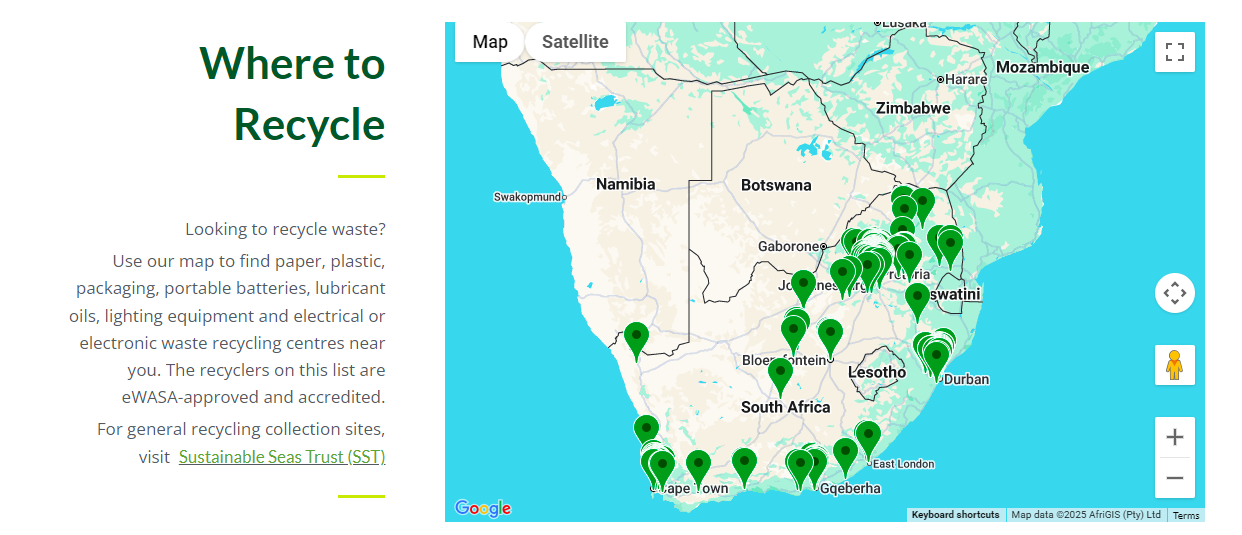International E-Waste Day: Recycle Responsibly with eWASA
Every year on 14 October, we are part of International E-Waste Day. The event was launched by the WEEE Forum to spotlight the growing challenge of electrical and electronic waste (e-waste). From laptops and televisions to mobile phones, toys, and household appliances, these discarded devices represent one of the fastest-growing waste streams globally.
According to global reports, Africa generates millions of tonnes of e-waste annually, yet only a small fraction is recycled responsibly. That’s why International E-Waste Day is so important: it encourages everyone, businesses, communities, and individuals, to rethink how they recycle electronics in South Africa.
The EPR Waste Association of South Africa (eWASA) plays a leading role in driving change, building national collection networks, and ensuring waste is managed safely. But lasting progress requires collective action.
Why E-Waste Recycling Matters
E-waste isn’t just “junk.” It often contains hazardous substances, including lead, mercury, and cadmium, that can contaminate soil and water if dumped in landfills. At the same time, discarded electrical and electronic equipment is rich in valuable resources such as gold, copper, and aluminium.
By choosing responsible e-waste disposal in South Africa, we:
- Protect the environment and public health.
- Recover resources for reuse in manufacturing.
- Reduce the need for destructive mining.
- Support job creation in the green economy.
When South Africans repair, donate, and recycle electronics responsibly, e-waste transforms from a problem into an opportunity.
How Companies Can Lead E-Waste Management in South Africa
Businesses are among the largest consumers of technology, which means they are also significant contributors to electronic waste. By taking proactive steps, companies can support sustainability and be in compliance with regulations.
1. Set Up Take-Back and Recycling Systems
Corporate offices and retail outlets can install e-waste collection points where staff and customers safely drop off old devices and other recyclables. Partnering with eWASA-approved recyclers ensures responsible processing.
2. Adopt Circular Procurement
Companies can reduce waste by purchasing repairable or refurbished electronics, extending their life cycle and lowering costs. This approach supports the circular economy in South Africa.
3. Educate Employees and Clients
Launch e-waste awareness campaigns internally and externally. Staff workshops, newsletters, and client guides can highlight the benefits of recycling and point to approved disposal options.
4. Collaborate with eWASA
Partnerships with e-waste recycling programmes in South Africa, such as eWASA, help strengthen infrastructure, extend reach, and support national goals.
How Individuals Can Take Action
Everyone has a role to play in building a cleaner future.
1. Repair Before Replacing
Before upgrading, ask: Can my phone or laptop be repaired or upgraded? Small fixes can extend a device’s lifespan and delay waste.
2. Donate or Resell Working Electronics
Old but functional devices can be donated to schools, NGOs, or community centres, or sold via safe second-hand platforms. This keeps electronics in use longer.
3. Recycle Responsibly
When gadgets reach true end-of-life, don’t throw them in the bin. Find your nearest e-waste recycling collection point in South Africa via eWASA. This ensures safe, environmentally sound, accredited recycling.

4. Raise Awareness
Talk about e-waste at home, in your neighbourhood, and online. Share International E-Waste Day posts, encourage friends to recycle, and help spread a culture of sustainability.
International E-Waste Day Activities in South Africa
On 14 October, communities, schools, and businesses across the country will take part in activities such as:
- E-waste collection drives where residents drop off old electronics.
- School education programmes that teach children about the dangers of improper disposal and the benefits of recycling.
- Corporate initiatives to launch new business e-waste recycling programmes.
These efforts raise awareness while providing safe, accessible ways to dispose of unwanted electronics.
Building a Circular Economy Together
International E-Waste Day is not just about one day of action. It’s about creating long-term change. By supporting responsible e-waste management in South Africa, we:
- Reduce the strain on landfills.
- Recover critical resources from old electronics.
- Generate green jobs in recycling and refurbishment.
- Protect the health of communities and ecosystems.
This is the essence of the circular economy: keeping valuable materials in use for as long as possible.
Get Involved with eWASA
This year, we are partnering with WESSA and 1More Time to host a schools’ e-waste excursion in Cape Town. In addition, we are organizing e-waste collection drives at the University of the Free State and the Eden Meander Lifestyle Centre, in collaboration with Henque Waste. In Umgeni, we are working with Polyco and the local municipality to host a collection drive at a nearby school. Together with Msini Holdings and another local school, we will also host an event at Hazelmere Dam in Verulam to collect e-waste and raise community awareness.
International E-Waste Day reminds us that every device carries responsibility and opportunity. By working together, we can lead in responsible electronics recycling, turning waste into resources and challenges into opportunities.
Sources:
- WEEE Forum – International E-Waste Day: https://weee-forum.org/iewd-about/
- Global E-Waste Monitor (United Nations): https://ewastemonitor.info/


